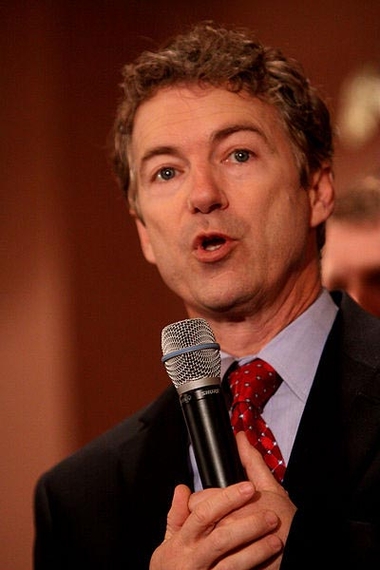2016 looms: Rand Paul, Jindal visit early voting states

STEVE PEOPLES, Associated Press
THOMAS BEAUMONT, Associated Press
CEDAR RAPIDS, Iowa (AP) — Republican Sen. Rand Paul opened his presidential exploration tour Friday with a splashy set of speaking engagements in Iowa designed to broaden his tea party brand into something more mainstream and, perhaps, viable.
At the same time, another Republican, Louisiana Gov. Bobby Jindal, became the first potential 2016 presidential candidate this year to visit New Hampshire, unofficially kicking off the state's presidential primary season roughly 2½ years before voting begins.
Paul, the son of former Texas Rep. Ron Paul, capped his first day as a presidential prospect in Iowa by headlining the party's annual Lincoln Day dinner. He told about 500 of the state's most influential Republicans that they must undertake the difficult task of drastically altering their tone toward black and Hispanic voters.
"We're an increasingly diverse nation and I think we do need to reach out to other people that don't look like us, that don't wear the same clothes, that aren't exactly who we are," he told the vastly white audience. "We need to express something that attracts people to our party."
The audience members, who had laughed and applauded at Paul's jokes earlier in the speech, were mostly silent in response. A few minutes later, they applauded and cheered at the conclusion of his remarks.
Dubuque Republican Jennifer Smith said Paul's prescription for the party is the right one but difficult to accept. "Sometimes it's hard to hear something you think you're doing right, when it turns out you're not," Smith said.
Paul has offered such intraparty criticism before and likely will continue as he reintroduces himself in early voting New Hampshire and South Carolina as a durable would-be candidate able to broaden the GOP into diverse voting blocs dominated by Democrats. He's already laid some of the groundwork for his case by speaking to black and Hispanic audiences and saying he opposes a federal ban on gay marriage.
"I think people are looking for something different. You might accuse me of being not exactly the traditional cookie-cutter Republican," Paul told reporters during a Friday afternoon of political events in Cedar Rapids. "I do know the GOP needs to grow and I want to be part of growing the GOP."
More than 1,000 miles away, Jindal reiterated his call for the GOP to stop being "the stupid party," insisting that Republicans must expand their message beyond budget austerity and shrinking government.
"In Louisiana, in New Hampshire and in America, we cannot be the party that's obsessed with government and government only," he said at a Manchester, N.H., fundraiser for state senators.
While Jindal hasn't ruled out a White House bid, he insisted Friday that he visited New Hampshire simply to help the local GOP.
"The reality is anybody who's thinking about 2016 needs to have their head examined," Jindal said. "It's way too early."
All of the prospective GOP candidates face the challenge of uniting a party without a definitive leader after election losses last year. Key voting blocs — women, blacks and Hispanics — voted overwhelmingly for Democrats. Republicans lost seats in the GOP-controlled House, failed to capitalize on a once-promising shot at winning the Senate majority and the party's presidential nominee, former Massachusetts Gov. Mitt Romney, failed to unseat Obama.
Jindal said the GOP must work to appeal to "100 percent of America" and called for a more "compassionate solution" for the nation's immigration debate. But he refused to endorse the bi-partisan immigration bill moving through the Senate that includes a pathway to citizenship for immigrants in the country illegally.
Paul said Friday that the party itself must change, and that means taking another look at policies that have alienated some groups. For instance, he favors relaxing federal sentencing laws for drug crimes, which disproportionately penalize racial minorities.
The Kentucky Republican has crafted a more aggressive schedule reaching out to Republicans in early voting states to make the case that he can unite the party and broaden its appeal. He starts with a key advantage: the base of more than a million supporters of his father, a libertarian Republican who sought the presidency in 1988, 2008 and 2012.
On Friday, Paul met with about 10 evangelical pastors — influential in Iowa's Republican caucuses — and about 25 area GOP activists at a rural home outside Cedar Rapids. He's scheduled to attend an eastern Iowa GOP breakfast on Saturday.
He's is slated to deliver the keynote address at a party banquet in New Hampshire. He'll cap May's busy travel schedule with a speech at the Ronald Reagan Presidential Library in California on May 31.
Then it's back to Iowa next month to court more pastors. And on June 28, Paul attends a fundraiser for Republicans in South Carolina, another early primary state in presidential nominating campaigns.
Among the challenges Paul faces is explaining his opposition to a federal gay marriage ban to influential cultural conservatives in Iowa. Paul says he would fight gay marriage at the state level, an explanation that suffices for Tamara Scott, among Iowa's leading Christian conservatives.
"He's trying to strategize where we can keep marriage as God designed," Scott said.
But some Iowa Republican activists are wary of Paul's views, many of which they see as in line with his father's libertarian ideals and at odds with GOP orthodoxy. Paul said last month Republicans "need to be the party that is reluctant to go to war," and the strong national defense he supports should be for "prevention of war," not for intervening in conflicts around the globe.
"He has a few ideas that maybe wouldn't be exactly mine. That would be national security," said Gwen Ecklund, a Republican county chairwoman in conservative western Iowa.
___
Peoples reported from Manchester, N.H.
___
Follow Tom Beaumont on Twitter: http://twitter.com/TomBeaumont
Copyright 2013 The Associated Press.





